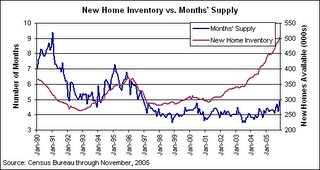Real estate's January report card
From Inman News:
Real estate's January report card
The housing market continues to show signs of slowing, but very little evidence of the "bursting bubble" that has been predicted for more than three years by some prognosticators. One sign of slowing is the level of unsold new homes.
There are now nearly 200,000 more unsold new homes under construction than there were just five years ago. Rapidly rising sales have masked the surge in construction.
Most analysts focus on the months of new-home supply, which is shown below. Since hitting a low of 3.5 months of supply in the summer of 2003, this number has gradually increased to its current value of 4.9 months, its highest value since December 1996.
While 4.9 months of supply is not concerning because the figure remains so low by historical standards, the months of supply calculation is held down by the high level of sales. If sales slow even a little, the months of supply figure will surge, as it did in 1990. The total number of unsold new homes is shown in the purple line below. There were 503,000 unsold new homes in November 2005, compared with 305,000 in November 2000.
Take it with a grain of salt as it comes from a real estate news service. However, with exising and new home inventories breaking records almost daily, I can't believe that the situation is still being described as "slowing".
Demand is already declining quickly, as it does so 'months supply' will begin to skyrocket to levels seen in the early nineties.
Real estate's January report card
The housing market continues to show signs of slowing, but very little evidence of the "bursting bubble" that has been predicted for more than three years by some prognosticators. One sign of slowing is the level of unsold new homes.
There are now nearly 200,000 more unsold new homes under construction than there were just five years ago. Rapidly rising sales have masked the surge in construction.
Most analysts focus on the months of new-home supply, which is shown below. Since hitting a low of 3.5 months of supply in the summer of 2003, this number has gradually increased to its current value of 4.9 months, its highest value since December 1996.
While 4.9 months of supply is not concerning because the figure remains so low by historical standards, the months of supply calculation is held down by the high level of sales. If sales slow even a little, the months of supply figure will surge, as it did in 1990. The total number of unsold new homes is shown in the purple line below. There were 503,000 unsold new homes in November 2005, compared with 305,000 in November 2000.
Take it with a grain of salt as it comes from a real estate news service. However, with exising and new home inventories breaking records almost daily, I can't believe that the situation is still being described as "slowing".
Demand is already declining quickly, as it does so 'months supply' will begin to skyrocket to levels seen in the early nineties.

Interesting that this is supposed to be a "January" report card, yet most of the real estate statistics being quoted as justification for the 'grade' were from November (and a handful from December).
Caveat Emptor!
Grim

3 Comments:
When we lived in NJ 10 years ago, the market was just starting to recover. We built a house in 1984 and the prices had doubeled by 1989 similar to today's market. Then the sh...t hit the fan. We put the house up for sale but it was too late, prices were on there way down........Falling knife.Couldn't lower price fast enough............Took house off the market after 9 months.
Sellers are still hanging on to their "Dream Profits". It's like taking candy away from a baby. Sellers think they are taking a loss by lowering their prices. As soon as they have to sell is when the rubber meets the road. Comps come down, prices follow etc. May take a few years.
http://www.economist.com/opinion/
displaystory.cfm?story_id=5385434
I have been following a site now for almost 2 years and I have found it to be both reliable and profitable. They post daily and their stock trades have been beating
the indexes easily.
Take a look at Wallstreetwinnersonline.com
RickJ
Post a Comment
<< Home